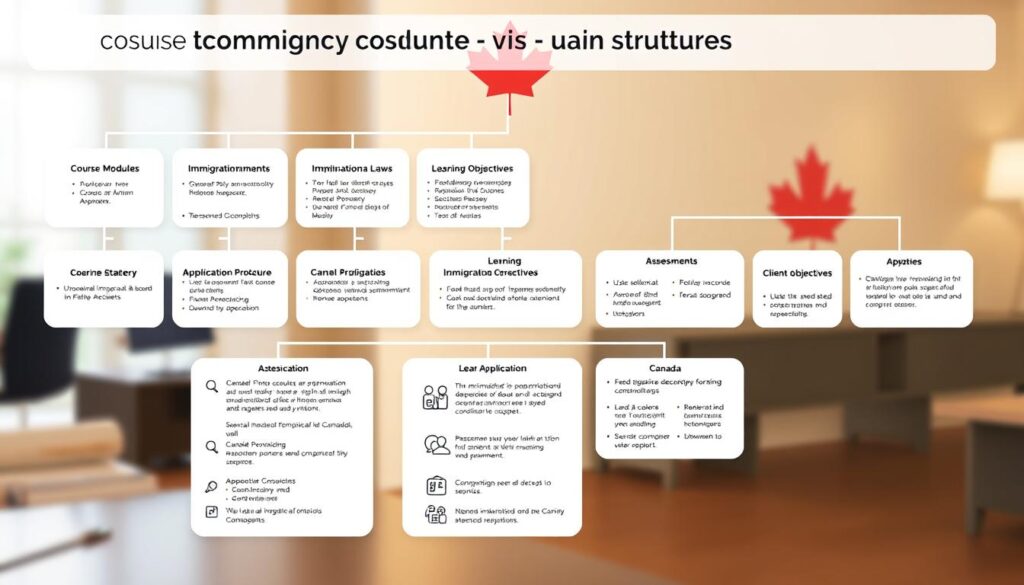Canada’s growing population goals create urgent demand for skilled professionals who understand visa processes. Specialized training equips you to guide applicants through complex systems while adhering to federal regulations. Programs blend theoretical knowledge with practical tools, ensuring you’re ready to address real-world challenges.
Courses like Introduction to Canadian Immigration Law and Legal Research build expertise in evaluating eligibility criteria. You’ll master strategies for submitting error-free applications through the official visa portal, reducing delays for clients. Practical exercises simulate scenarios like addressing incomplete documentation or resolving case-specific hurdles.
Graduates often qualify for certification from the Immigration Consultants of Canada Regulatory Council (ICCRC), a requirement for legal practice. This credential positions you to work with law firms, settlement agencies, or private consultancies nationwide. Training also emphasizes cultural sensitivity, preparing you to support diverse clients effectively.
Key Takeaways
- Specialized programs align with Canada’s rising demand for visa application experts
- Hands-on learning covers legal frameworks and government portal navigation
- Industry certifications meet national licensing requirements
- Practical training mirrors challenges faced in professional settings
- Skills apply across private and public sector career paths
Overview of Immigration Consultant Classes in Canada
Specialized training prepares professionals to meet Canada’s evolving visa processing needs. Leading institutions like Queen’s University offer graduate diplomas combining legal frameworks with hands-on tools for evaluating applications. These programs align with the College of Immigration and Citizenship Consultants’ licensing standards, ensuring graduates meet national requirements.

Why Choose This Program?
Structured courses teach you to interpret policies and resolve documentation gaps efficiently. You’ll gain specialized knowledge through modules like Citizenship Law Fundamentals and Case Analysis Techniques. Real-world simulations show how to address delays or eligibility disputes using government portals.
Benefits for Your Canada Visa Application
Mastering the visa portal lets you track submissions and update client files accurately. Training emphasizes cultural awareness to support refugees, skilled workers, and families navigating residency options. You’ll develop problem-solving strategies for complex scenarios while maintaining compliance.
| Program Focus | Key Skills Developed | Career Outcomes |
|---|---|---|
| Legal Frameworks | Eligibility Assessment | Licensed Practitioner |
| Visa Portal Navigation | Client Communication | Settlement Agency Roles |
| Certification Prep | Documentation Management | Private Consultancy |
Note: The Entry-to-Practice Exam pass rate for Queen’s graduates exceeds 80%, reflecting the program’s effectiveness. This training adapts to policy changes, keeping your expertise current with federal guidelines.
Navigating the Canada Visa Portal
Digital proficiency in official systems ensures precision when guiding clients through federal processes. The government’s primary platform consolidates critical resources, from application checklists to policy amendments. Training focuses on optimizing your ability to extract accurate data while avoiding common navigation pitfalls.
Accessing Essential Information
You’ll learn to filter search results by visa category, identifying specific requirements for work permits or family sponsorships. The portal’s advanced search tools reveal hidden documentation guidelines that novices often overlook. Real-time updates about processing delays appear in dedicated alert sections, enabling proactive client communication.
Master tracking features to monitor submission stages and identify missing materials before officials flag them. Interactive dashboards display estimated approval timelines based on current workload trends. This lets you set realistic expectations while preparing backup plans for complex cases.
Policy change logs detail adjustments to eligibility criteria across economic immigration streams. You’ll practice interpreting these updates through scenario-based exercises, ensuring advice aligns with the latest regulations. Quarterly webinars hosted through the portal provide direct access to policy analysts for clarifying ambiguities.
Database shortcuts help cross-reference client profiles with successful historical submissions. You’ll discover how to bookmark frequently used forms and create personalized resource libraries. These skills minimize research time while maintaining compliance with evolving federal standards.
Immigration Consultant Classes: Course Curriculum and Structure
Structured learning paths combine legal expertise with digital tools to master visa processes. Leading programs like Queen’s Graduate Diploma and Herzing’s Case Manager training deliver focused skill development through interactive formats. These options balance theoretical depth with applied techniques for navigating federal systems.

Core Modules and Learning Objectives
Your journey begins with nine-course sequences covering legal frameworks and administrative protocols. Foundational subjects include document verification methods and policy interpretation strategies. Specialized courses explore economic immigration pathways and family reunification processes, mirroring real client needs.
Advanced modules teach portal navigation skills, including submission tracking and deadline management. You’ll practice resolving common errors like mismatched supporting documents. Weekly exercises build proficiency in assessing eligibility across 20+ visa categories.
Practical Training and Case Studies
Simulated client interactions prepare you for high-pressure scenarios. Role-playing exercises challenge you to address incomplete applications or urgent processing requests. One student recently reconstructed a denied work permit file during training, achieving approval in mock revisions.
Programs integrate 5-week internships with licensed professionals, letting you manage live cases under supervision. These experiences refine your ability to balance compliance with compassionate client support. Final projects involve creating complete sponsorship packages using actual portal templates.
Understanding Canadian Immigration Law and Procedures
Navigating Canada’s legal landscape requires precise knowledge of federal statutes and their practical applications. Training programs focus on interpreting legislation that shapes entry requirements and residency pathways. This expertise helps professionals guide clients through nuanced scenarios while maintaining compliance.

Key Legal Concepts and Requirements
You’ll master the Immigration and Refugee Protection Act (IRPA), the cornerstone of all visa decisions. This includes analyzing admissibility rules covering criminal history, medical concerns, and security risks. Interactive exercises teach you to identify red flags in application files before submission.
Programs clarify how provincial nominee systems interact with federal economic streams. For example, Quebec’s selection criteria differ significantly from Ontario’s priorities. You’ll learn to cross-reference regional guidelines with national policies using the official visa portal.
Case studies explore humanitarian applications and family sponsorship procedures. These simulations reveal how tribunals assess evidence during appeals or residency disputes. Real-world examples show how judicial rulings impact processing timelines and documentation standards.
Your training covers interpreting legal requirements for temporary versus permanent status seekers. This includes work permit conditions, study visa restrictions, and citizenship eligibility thresholds. You’ll practice drafting refusal response letters that address specific sections of Canadian immigration law.
Advanced modules develop skills to analyze precedents from the Federal Court database. This prepares you to advise clients on complex cases involving inadmissibility waivers or procedural fairness arguments. The curriculum emphasizes practical tools for staying current with policy amendments published through government channels.
Expert-Led Training and Instructor Profiles
Mastering visa processes requires guidance from professionals who’ve navigated complex cases firsthand. Leading programs connect you with practitioners actively shaping Canada’s legal landscape through daily client work and policy engagement.

Meet Your Industry Experts
Your instructors hold active licenses with the College of Immigration and Citizenship Consultants. Alyson Alfred brings 20 years of expertise representing clients before the Immigration and Refugee Board. Marilyn Taupan merges business leadership skills with deep knowledge of sponsorship procedures across provinces.
Cassandra Fultz, managing partner at Doherty Fultz Immigration Inc., shares strategies from her 85% success rate in appeals. “Understanding portal navigation shortcuts can save clients six months in processing delays,” she emphasizes during hands-on workshops.
Real World Experience and Success Stories
Faculty members regularly handle cases involving inadmissibility waivers and residency disputes. One instructor recently secured permanent status for a family facing language-test barriers through strategic documentation.
You’ll learn to:
- Apply portal features that reduce application errors
- Interpret policy updates from federal alerts
- Develop response letters addressing specific legal clauses
Mentorship opportunities connect you with professionals currently advising government panels on immigration reforms. This network supports your transition from training to practice while keeping skills aligned with evolving standards.
Student Success Strategies and Exam Preparation
Building expertise in visa processes demands more than legal knowledge—it requires smart study habits tailored to complex material. Specialized courses help you master time management while navigating official resources like government portals. You’ll learn to transform theoretical concepts into practical skills through personalized approaches.

Effective Study Techniques
Discover your optimal learning style through assessments identifying visual, auditory, or hands-on preferences. Visual learners might color-code portal navigation steps, while auditory types benefit from discussing case studies aloud. Kinesthetic students often retain information best through interactive portal simulations.
Time-blocking strategies help balance coursework with personal commitments. Weekly planners break down tasks like analyzing policy updates or practicing mock visa applications. One graduate reported cutting study hours by 30% while improving retention through these methods.
| Study Technique | Application Method | Outcome |
|---|---|---|
| Learning Style Assessment | Customized note-taking systems | 25% faster concept mastery |
| Time Blocking | Priority-based task scheduling | 40% fewer deadline misses |
| Mock Exams | Portal-based practice tests | 85% first-attempt pass rates |
Stress-reduction workshops teach breathing exercises and focus techniques for high-pressure exams. Students practice these during timed simulations of the CICC Entry-to-Practice test. “The anxiety management tools helped me think clearly during my certification exam,” notes a recent program completer.
Memory retention methods include creating digital flashcards for legal precedents and portal shortcuts. Collaborative study groups analyze real refusal letters to build critical thinking skills. These approaches ensure you’re prepared to handle complex cases while maintaining compliance with federal standards.
Industry Certifications and Career Development
Credentials in legal services open doors to regulated practice across Canada. Programs accredited by the College of Immigration and Citizenship Consultants equip you with skills to pass the mandatory Entry-to-Practice Exam. Successful graduates earn a Queen’s University Graduate Diploma, recognized nationally as proof of expertise.
Stand Out in a Competitive Market
The CICC certification process tests your ability to navigate federal portals and interpret policy updates. You’ll demonstrate mastery of documentation standards and ethical guidelines required for licensing. This qualification meets strict educational benchmarks set by regulatory bodies.
New professionals complete supervised mentorship programs to refine client management techniques. Ongoing training through Continuing Professional Development courses keeps your knowledge current with policy shifts. These requirements ensure you maintain high service standards throughout your career.
Opportunities for Continued Professional Growth
Certification unlocks roles in legal firms, settlement organizations, and private consultancies. Many graduates transition into policy analysis or tribunal representation within five years. Networking events hosted by industry associations provide connections to leaders shaping national standards.
Your diploma serves as a foundation for launching independent practices or specializing in niche areas like refugee sponsorship. With 82% of certified professionals reporting career advancement within two years, this path offers tangible growth potential in Canada’s evolving legal landscape.
Flexible Learning Options and Format
Educational pathways adapt to modern lifestyles through diverse delivery methods. Whether balancing work or family responsibilities, you’ll find formats matching your schedule. Each approach integrates training on navigating the Canada visa portal – a critical skill for professional success.
In-Person, Online, and Hybrid Delivery Methods
The Graduate Diploma’s online environment features weekly live tutorials with instructors. Herzing’s program offers evening and weekend sessions, ideal for working professionals. Both options include practical exercises using actual visa portal interfaces.
Choose self-paced modules or structured timelines spanning 24-36 months. Evening virtual classes let you maintain daytime commitments while progressing through courses. Discussion forums foster collaboration between students nationwide.
Key advantages:
- Real-time feedback during portal navigation simulations
- Recorded lectures for reviewing complex procedures
- Direct messaging with licensed practitioners
Start building expertise today through formats designed for tangible career outcomes. Flexible scheduling ensures you develop crucial skills without pausing other priorities.



